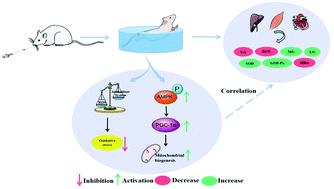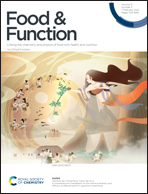The anti-fatigue effect of the Auxis thazard oligopeptide via modulation of the AMPK/PGC-1α pathway in mice†
Abstract
The Auxis thazard oligopeptide (ATO) was obtained by papain digestion and ultrafiltration membrane separation, and its anti-fatigue effects and mechanisms were evaluated using animal experiments on Kunming mice. Compared with the negative control group, the ATO extended the time to exhaustion in mice in a forced swim test by 0.81–1.62 times. Liver glycogen levels were significantly increased by 0.6–1.63 times and muscle glycogen levels were increased by 9.52–10.02%; the levels of lactic acid (16.46–17.21%) and urea nitrogen (34.88–41.91%) decreased. The ATO also increased antioxidant activity, reduced malondialdehyde levels (18.00–35.79%) in the liver and myocardium, and increased the gene and protein expression of AMPK and PGC-1α in fatigued mice. These results indicate that the ATO exerts an anti-fatigue effect via improving energy metabolism and decreasing oxidative stress.



 Please wait while we load your content...
Please wait while we load your content...